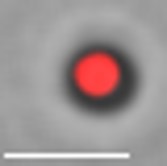Tuesday, 16 April 2024
New research has found that a natural predatory bacteria, long known to target its prey by burrowing inside of them, is actually able to kill by delivering a ‘kiss of death, meaning it doesn’t have to live inside its prey to kill it, as previously thought.
The new study, led by experts in the School of Life Sciences at the University of Nottingham and published in Nature Communications, found that Bdellovibrio bacteriovorus, when missing a special “MIDAS” adhesive molecule, is still able to apply a molecular "kiss of death" to bacteria, delivering predatory proteins that kill prey bacteria without the predator living inside them.
This reveals new biochemical details about the evolution of predation and new proteins involved in killing bacteria.
 Live- dead stained microscope images of a) the normal invasion, rounding and killing of a (red and black) prey cell, by an invading (green)
Live- dead stained microscope images of a) the normal invasion, rounding and killing of a (red and black) prey cell, by an invading (green)
The discovery is another step towards scientists being able to use these predators to target and kill problematic bacteria that cause issues in healthcare, food spoilage and the environment.
The team in Nottingham used fluorescently coloured microscopy and genetics work, to show that a mutant form of the predator, with defects in a single adhesin, could sometimes fail to enter prey bacteria, but surprisingly still killed them. The use of different fluorescent colours allowed the team to locate the predatory bacteria while assessing the live or dead state of the prey bacteria.
Professor Andrew Lovering in the School of Biosciences, at the University of Birmingham, examined the structure of the adhesin and defined novel components of it specific to this behaviour. His data also guided team in Nottingham to test key amino-acids, associated with a MIDAS adhesin motif, which were found to be required for normal entry of the predator to prey.
Having seen that the predator could kill the prey without normal invasion, the team in Nottingham purified the empty but dead prey cells, testing for any predator proteins that may have been "kissed across" into them by the mutant predators who failed to enter.
 Bacteriovorus predator, compared to b) the rounding and killing of a prey cell (red and black) by the “kiss of death” of MIDAS mutant B. bacteriovorus predator without invading it.
Bacteriovorus predator, compared to b) the rounding and killing of a prey cell (red and black) by the “kiss of death” of MIDAS mutant B. bacteriovorus predator without invading it.
The group of Bdellovibrio proteins found included some totally unstudied predator proteins, as well as proteins known to take part in bacterial killing during normal invasion.
Professor Liz Sockett, from the School of Life Sciences at the University of Nottingham, said: “This latest discovery of proteins will help our future understanding on what kills bacteria and how predatory bacteria evolved this toolset that kills prey.”
The research was carried out by Dr Jess Tyson and a team from Professor Liz Sockett's lab in the School of Life Sciences at the University of Nottingham, including Rob Till. The team worked with Professor Andrew Lovering at the School of Biosciences at the University of Birmingham, on a joint project funded by the Wellcome Trust and collaborating on gene transcription with Dr Simona Huwiler at the Institute of Plant and Microbial Biology University of Zurich.
The full research can be found here.
Story credits
More information is available from Professor Liz Sockett in the School of Life Sciences at the University of Nottingham at liz.sockett@nottingham.ac.uk
Notes to editors:
About the University of Nottingham
Ranked 32 in Europe and 16th in the UK by the QS World University Rankings: Europe 2024, the University of Nottingham is a founding member of the Russell Group of research-intensive universities. Studying at the University of Nottingham is a life-changing experience, and we pride ourselves on unlocking the potential of our students. We have a pioneering spirit, expressed in the vision of our founder Sir Jesse Boot, which has seen us lead the way in establishing campuses in China and Malaysia - part of a globally connected network of education, research and industrial engagement.
Nottingham was crowned Sports University of the Year by The Times and Sunday Times Good University Guide 2024 – the third time it has been given the honour since 2018 – and by the Daily Mail University Guide 2024.
The university is among the best universities in the UK for the strength of our research, positioned seventh for research power in the UK according to REF 2021. The birthplace of discoveries such as MRI and ibuprofen, our innovations transform lives and tackle global problems such as sustainable food supplies, ending modern slavery, developing greener transport, and reducing reliance on fossil fuels.
The university is a major employer and industry partner - locally and globally - and our graduates are the second most targeted by the UK's top employers, according to The Graduate Market in 2022 report by High Fliers Research.
We lead the Universities for Nottingham initiative, in partnership with Nottingham Trent University, a pioneering collaboration between the city’s two world-class institutions to improve levels of prosperity, opportunity, sustainability, health and wellbeing for residents in the city and region we are proud to call home.
More news…